|
|
|
Ruth's Allergy Diary |
|
 Ruth Holroyd has allergies – lots of them! She is anaphylactic to nuts, dairy and celery; severely intolerant to soya, tomatoes, a number of herbs, and intolerant to wheat; she suffers from asthma and eczema, both triggered by her allergens and is also allergic to nickel and dust – the latter causing more asthma problems than the food. She was born with a nut allergy, has collected the others throughout life and is still developing new ones! Ruth works as a freelance marketing communications specialist and is professional copywriter. She also blogs very actively on her own blog What Allergy?, is involved in several of the allergy charities and runs a local support group. She is a keen walker and is happily married to a full strength wheat, gluten, dairy, soya, tomato and herb eater! By strange coincidence he has anaphylaxis to snails and a mild dust allergy. This is her allergy diary - but for more of her thoughts on allergy and all of its associated problems, check in to her blog What Allergy? – 'one of the 5 top UK allergy blogs'! 31st March 2018 – When do you drop the 'A' bomb?... 3rd February 2018 – Not all beer contains wheat…so why do most pubs think it does? 2nd September 2017 – Unfit for FitBit – nickel allergy and FitBit trackers 23rd July 2017 – Surviving concerts with allergies… not easy at all 27th May 2017 – Living out of a suitcase with multiple life threatening allergies 2nd April 2017 – My FreeFrom Food Awards 2017 winners #FFFA17 29th October 2016 – Going gluten-free is Sicily is easy 3rd February 2017 – Learning to cook FreeFrom all’Italiana is a big hit! 29th October 2016 – Going gluten-free is Sicily is easy 15th September 2016 – 'Going processed food free' and avoiding those slip-ups. 31st July 2016 – Will you take the 'Go Processed Food Free challenge'? 17th June 2016 – It's all about me - eating out with allergies 13th April 2016 – Pizza Express new #GF dough balls and butter, butter and more butter! 18th March 2016 – Surely you can’t have hay fever ALL YEAR ROUND! 17th February 2016 – Why I lie about my allergies 23rd January 2016 – Changing tastes 19th December 2015 - Cosmetics and personal care manufacturers have no idea how frightening allergies are and should stop bashing 'freefrom'. 24th October 2015 - Being the only allergic girl in the office 28th August 2015 - Please don't tell me to stop scratching 31st July 2015 - Holidays? No holiday from allergies 4th July 2015 - How Protopic changed my life - a year on. 6th June 2015 - BBQ booby trap! Ruth thought she had been so careful - but not careful enough.... 9th May 2015 – A harsh lesson for allergics - the world does not revolve around you! March 2015 – Salt baths, oils and bathing less for eczema skin February 2015 – 'I always wondered if it was my fault....' says Ruth's mum January 2015 – Marrying the allergic girl – What Mr What Allergy? feels about it!! December 2014 – "Why don't you allergic people just stay at home? You are ruining it for the rest of us." November 2014 – Breaking out! October 2014 – How Protopic changed my life September 2014 – Is there an eczema solution? August 2014 – The state of the nation’s understanding of Anaphylaxis July 2014 – What is the future for people with allergies? June 2014 – Tales from the front line – eating out in a foreign country May 2014 – The psychological effects of living with facial eczema and allergies April 2014 – How important is the ‘allergic load’ and how do you stop the allergic march? March 2014 – Getting an allergy diagnosis – know your body March 2014 – Allergy services - Getting the support you need February 2014 – Cheese... Dear Dairy.... February 2014 – More thoughts on auto-injectors.... Just do it! Don’t panic. Use your auto-injector and phone 999... January 2014 – Adrenaline Auto-injectors explained - Which one do you use? January 2014 – Be thankful – having allergies can be a gift 31st March 2018 When do you drop the A bomb?... Recently I have started to brave the murky waters of internet dating. I won’t go into details, except to say that I am still happily single and have discovered one very useful tip for weeding out the anyone but the most interested, desperate or fool hardy would be daters. If and when I do meet someone, at what point in the relationship do I drop the ‘A bomb’? When how do you bring it up? And do you go the whole hog? Demonstrate how to inject and everything? I have been brave and mentioned my allergies to the few men interested in my dating profile who were not 90 or 65 year old truckers from Barnsley. So far I have come across either a deathly silence or complete ignorance; one person asking if I had one of those needles you inject in your heart! I mean… really? Where is that block button? Another found it hysterical, announcing, “You’d never know if I slipped nuts in your meal!” WOW! I think that last comment was meant in jest but I did not find it even remotely funny at the time, having just tried to explain about what happened on a trip to America last year when I had the worst allergic reaction of my life. The ‘A’ bomb did prove to be a very good way of despatching unwanted attention. However, deleting and leaving the dating sites worked much better! I never imagined having life threatening allergies would come in so handy. It may just be an indication of the intelligence, quality, or lack thereof, of the men on dating sites. If I ever braved those sites again I would change my profile heading to “Allergic to nut-ters…” I would love to hear what others think and particularly from anyone who has had similar experiences. I’m giving dating sites a very wide berth, they are definitely not for me. But I’m sure there is a guy out there who is man enough to take on the most allergic woman on the planet and ‘every chef’s nightmare’ as I have been affectionately referred to.
3rd February 2018 Not all beer contains wheat…so why do most pubs think it does? 
I’m rather fed up of being told by publicans and bar staff alike that ‘all our beer contains wheat’ when I ask. Because whilst I’m no beer expert, I am very well aware that actually, all your beer probably contains barley, but only some of your beer will contain wheat. The food allergen regulations have made eating out so much easier and this should be the same for drinking. Alcohol can also contain allergens and as such all bottled wine and beer is now labelled with allergens in bold. So why doesn’t this apply to beer from the tap? Being real ale lover, I enjoy sampling different beer. I don’t always want to pay for an over priced bottle just to ensure I won’t be drinking wheat by mistake, but this is often what I have to do. It wouldn’t be difficult to solve this problem. Both the manufacturers and the pubs themselves could put in place some very simple measures to help their staff understand the allergens in the lager and beer they serve.
So what are the bar staff supposed to do? It’s not easy for them to find out if none of the above are available to them. And if even most CAMRA real ale beer aficionados assume ‘all beer contains wheat’ as I have been told at nearly every real ale festival I’ve been to, then how is anyone else supposed to know? There is a very real difference between wheat and barley, although for a coeliac it’s more important to understand gluten as an ingredient, gluten free beer can still contain wheat. Confused? Come on beer marketers! Just a couple of really simple measures could mean that not only do you comply with allergen regulations and help to educate your staff, but those of us wheat allergic beer lovers can enjoy a safe pint of beer, knowing that they can check for allergens. I have written a blog about this and am building up a list of safe wheat free beers, but I can’t always remember, or check if there is a poor wifi signal in a pub. It means I have a very limited list of beers I know I can try and the joy of sampling different real ales is pretty much off the cards for me unless I buy bottled beer. So my challenge to pubs and bars is to label the allergens your beers. Simple! I’ll be checking… because I love beer. 2nd September 2017 Unfit for Fitbit – nickel allergy and Fitbit trackers 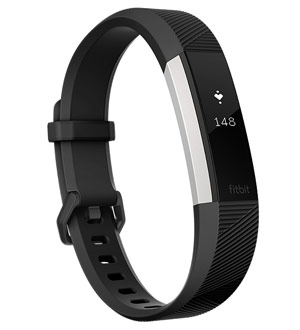
I love my FitBit. Since being given my first FitBit Flex about two years ago I have increased my daily step count and general fitness quite dramatically and I’ve loved every minute of the journey. I enjoy the competition of ‘Workweek Hustles’ and ‘Weekend Warrior’ challenges; I would probably say I’m addicted to my FitBit and slightly obsessed with checking my progress. You can imagine my horror to discover that my trusty little gadget was reaching the end of its natural life. My poor old FitBit Flex had lost the will to live. I soldiered on with it, charging it daily and resetting it with a pin but I’m going to have to put it down very soon. Why so glum you may ask. Why can’t you just buy another? Well this most basic of devices, with its simple plastic strap and no nickel is now discontinued and all the new trackers all appear to contain some nickel. I was very disappointed. Having got so attached to my FitBit for over two years, the prospect of not being able to have one was unsettling. Even FitBit don't know.... Some Google research, long conversations on FitBit forums and chats with FitBit’s staff just left me more confused. FitBit’s staff had no idea which products and which parts of these products might contain stainless steel. “Only the engineers know this!” they told me and “Even we can’t get to speak to them!” But many customers are still getting skin reactions, blisters and irritation. When you consider that 10-20% of the population have a nickel allergy you’d expect Fitbits to have this information available. This has been a known issue with FitBit for some time and their designers have done lots to reduce the amount of nickel in their products. The FitBit Force caused nickel allergic reactions to thousands of customers back in 2014. The FitBit Alta HR seemed to be the simplest tracker available from FitBit and so the best one to try. FitBit were really helpful in one respect. To compensate for my failing FitBit Flex, (nickel free and now discontinued), they gave me 50% discount to spend on my next product and a guarantee that I could return it if the product caused a reaction. So I am now the proud owner of a FitBit Alta HR. Finger’s crossed it will work out. What you can do to minimise reactions I am worried about the potential for reactions but there are many things that other nickel allergic customers have done:
So I have options… and I have my FitBit. One day, hopefully, they will make a nickel free one but meanwhile, I’ve been wearing my FitBit Alta HR for a day so far with no reactions… fingers and FitBits crossed! 23rd July 2017 Surviving a concert with allergies – not easy at all 
I’m not a huge concert goer, which might explain why I was ill prepared for this recent live music event. I went to British Summer Time (BST) at Hyde Park to see the Killers with Tears for Fears supporting. It was an awesome night out but since I was invited last minute as a spare ticket was available I just leapt at the chance. Who wouldn’t? Sounds great right? I can rock the healthy freefrom picnic, and with years of practise, most people envy my amazing freefrom supplies. Well it was all looking fantastic until right at the last minute, just the day before, my friend told me I wouldn’t be able to take food in. WHAT? I had my picnic either bought or planned. Coinciding rather conveniently with The Allergy Show in London, I had decided exactly what I would buy that morning at the show to take with me. Suddenly all my plans were up in the air. What could possible go wrong? So I took my picnic to the pub beforehand and duly wolfed down a very odd picnic, having not brought everything as planned, knowing it would likely be taken away. I wasn’t risking good allergen free food going to waste. I pretty much munched my way through the morning, polishing off my packed lunch of Leggera focaccia, humous and Bfree pittas, some fruit, biscuits etc. I did manage to smuggle in some oat cakes in my makeup bag but I didn’t quite stretch to ‘hiding food in my pants’ as quite a few people suggested. I wish I had! Despite this grazing I began to feel peckish during the afternoon. After a few more hours I was starving. Couple that with quite a bit of booze and I knew I needed to eat. This proved impossible. I queued at two places which looked like they might be able to cater but staff had no idea. So I moved on. I never found the Customer Service Information Hub that was mentioned. The place was heaving and I kept getting lost. There were long queues everywhere and eventually I bought some chips and hog roast. A big mistake, as they also had no idea what the food contained but it looked OK and after nearly 1.5 hours hunting for sustenance I was about to eat my own arm. Within half an hour I was back in the tortuous queue for the loos for an unpleasant experience, praying I would get there in time. I did, thankfully but it was just not a good way to spend a few hours at a concert. So I learnt some very important lessons. I should have known before but here goes:
I survived and after the dust had settled I was able to find someone to correspond with on email who advised that me I would, had I contacted them a month in advance (the earlier the better) been able to find out: “For customers with a certain dietary requirement, several of the food vendors will offer suitable meals, but these may not be suitable for visitors with allergies. For those with specific requirements due to allergies we can offer exemptions in bringing food into the event. Please note that we must be contacted in good time before the event to make these arrangements - preferably a couple of weeks prior. The process of having an exemption request approved, and for an exemption letter to be provided, can take a few days. “
27th May 2017 Living out of a suitcase with multiple life threatening allergies Let me say this straight away, it has not been easy. (But not imopssible as you can see from the look in her eye when offered a genuinely freefrom burger!!) A hectic personal and work life has thrown so many challenges my way from away days, work meals out, team lunches, conferences, weddings, holidays… it’s been fantastic. But I’ve found that I can only deal with things in small chunks. I can plan for one thing but not the next and the next so they easily catch up on me and so I fail to implement the military organisation I normally manage. While I’ve been slowly losing the plot and failing to plan, those around me have just kept on getting better. I’m talking here about my colleagues, friends and catering at both large and small venues. Thank you to everyone who is helping me stay safe – you are all priceless and I really do appreciate it. I hope I’ve remembered to say thank you. Things are looking up I’ve realised when starting to write this diary that things have improved so much. I often arrive home to unpack finding that the stashed safe foods and emergency rations remain untouched. I just haven’t needed them. There is so much more understanding in the restaurant and hotel industry and also so many people admitting they have allergies, intolerances of coeliac disease which means I’m no longer the only one with the special meal. My unique challenges (four major food groups causing severe reactions) often mean that I get something even better than what everyone else has because my meal is often clean, healthy and missing the creamy sauces and unhealthy trimmings. I see the other diners looking on in envy and, for once, enjoy that smug feeling. Yes I’m special but I’m loving the fact that I can get lovely food just like all you normal people. There have been rather a lot of fruit salads but hey, I love fruit. I’m never going to complain about the lack of diversity in freefrom puddings. It really doesn’t bother me. I am just always so grateful to be taken seriously and given safe food. I need to make more effort at home… The only negative here is that because I’m living out of a suitcase and packing and unpacking every other day, my planning at home is dire. I now eat crisps, humous and oat cakes – sound familiar? My usual handbag picnic. I have only had one slip up over the last few months and that was very minor. I am lucky to have a dose related dairy allergy and I start feeling a reaction after the first taste. My coffee contained milk by mistake and I hadn’t noticed because I just assumed it was that lovely creamy finish you get with really fresh coffee. A lesson learnt – and I am now more vigilant when it comes to drinking out too. So to sum up my travels around the UK, I think things have improved massively. It now feels like the norm and getting a safe meal is easy. Not always stunning but I never fail to get something safe. Take aways and pubs do still have a way to go. It is rare that a pub can easily tell me which beer contains wheat – opting for the rather lazy and most probably inaccurate ‘all beer contains wheat’ to which I reply, can I have a pint of cider please. Frustrating, but by continuing to ask and when it’s not too busy, encouraging them to actually check, we will all learn. Keep on spreading awareness and keep smiling fellow travellers.
2nd April 2017 My FreeFrom Food Awards 2017 winners #FFFA17
Everyone’s a winner… but for me, it was all about the clean freefrom; so many products entering are freefrom the top 14, making them accessible to so many of the allergic community. Oh and those amazing pasties. Read on to find out how to get your hands on those… The FreeFrom Food Awards (and Eating Out and SkinCare) have become a firm and favourite part of my life now for four years and it is so exciting to see them growing year on year. 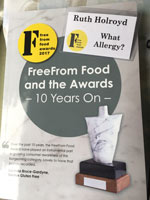
2017 marked the 10th anniversary and my first highlight – the memorial handbook – a lovely momento to remember the occasion, with entries on every winner and features on all the judges and organisers. I am dead chuffed to have a whole page all to myself. Something I shall keep, cherish and refer to. Here are my favourites from 2017

So who is coming for pasty with me? Let’s have a freefrom day out in London, starting with a wholesome pasty breakfast at Marylebone station. Who’s in? Picnic in a park? Come on. You know you want to. Message me or visit my blog if you’re interested and we’ll fix a date! (Ruth and Catherine Rose of Sweetcheeks planning their picnic in the park...)
3rd February 2017 Learning to cook FreeFrom all’Italiana is a big hit! 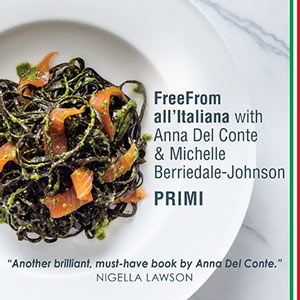
One thing I’ve really missed since not being able to eat dairy and wheat is Italian cooking. I do cook with wheat free pasta often but I don’t really do anything special with it and it’s usually just the chosen carb with no sauce, just plain old pasta. So you can imagine my excitement when I discovered that one of the most amazing and well respected Italian chefs had written a book especially for us humble freefromers. FreeFrom all’Italiana, Primi by Anna Del Conte and Michelle Berriedale-Johnson is THE must have book for anyone who is allergic to dairy and/or wheat. It was my favourite birthday present this year and I have already started experimenting. I love cooking but I tend towards quick and simple and am not very adventurous. I have certainly never entertained anchovies before but my first experiment into Italian cooking was a fantastic success. Move over Nigella… I’m learning to cook! Bean or buckwheat pasta with broccoli sauce For my first culinary masterpiece I chose this simple recipe and cooked it for my Mum. It was so tasty and although I struggled a little with actually following the instructions, my fault entirely, I will be making this again and seeing how much more amazing it could be if I didn’t go off the rails.The instructions were to add six tablespoons of oil. I refused to use this much, I just felt it was going to swimming in oil... However, you must trust Anna please everyone. It needed all that oil and my sauce was lacking without it. Having also never cooked with anchovies before I didn’t add quite enough anchovy fillets and feared they would be too overpowering. They were not, they were amazing and went perfectly with the garlic and chilli. One thing I learned the second time I cooked this was that if you use tinned anchovies you can use the oil from that and so will need to add less olive oil to the sauce. I also think I should have cut my broccoli smaller, but the overall effect was superb. I have honestly never cooked anything so full of flavour before. My next challenge will the Asparagus risotto. I have always wanted to know how to cook a proper risotto as I can never order this in a restaurant and my previous efforts just involve bunging in anything that’s in the fridge, oh and the obligatory frozen peas. I may even venture as far as mussels… but I’m easing myself in gently. Pasta and risotto first, then I’ve got my eye on two of the soups; courgette and garlic. This is so exciting! If you want to buy the book you can do so from good book shops or from Amazon here – £9.99 or £6.99 for an e-book. Or you can buy it direct from the FreeFrom all'Italiana site for a mere £7.99.
28th October 2016 Going gluten free in Sicily is easy
We booked a little private villa with its own pool in Palazzola Acreide, south of Catania, and cooked most of our meals there. Admittedly we didn’t brave it and eat out, despite taking translation cards, because all our scouting investigations proved that the locals had no English language skills at all. Just imagine miming that you would like to buy matches to light a BBQ and you get the picture. Much hilarious hand gestures and no matches! We didn’t really want a BBQ anyway. But I just didn’t feel brave enough to risk it. I wish I’d been more organised really but our villa was pretty remote, so the last thing you wanted to do at the end of a day spent basking in the sun was get in the car for a 45 minute drive to the nearest town. We visited some food markets and bought lovely local fruit, including the most amazing pomegranates I’ve ever tasted. They also specialise in some incredible looking broccoli that was pink, purple and blue! The local wine was pretty good so we did our bit the local economy and consumed quite a few bottles of that. A week in Italy is also an excuse to enjoy a glass or two of Prosecco.
What most impressed me were the food shops. We went to a local ‘despar’ which was quite a small shop with maybe five aisles, but in that one tiny store you could buy gluten free pizzas, flour, cakes, biscuits, pasta, cereals and more. They had almond, soya and rice milk and also lots of freefrom dairy produce which was actually all lactose free; no good for me, but I was impressed with the amount of choice for those with food restrictions in such a small supermarket. I was just happy to get some rice milk. Do take translations of the foods you can’t eat as we did spend quite a bit of time scouring ingredient labels – just as you would in the UK, but be prepared to check even more carefully. We didn’t venture to any out of town shops or larger towns or cities but I’m pretty sure their selection of freefrom produce would have been even better. I was so impressed with the vast array of allergen free food on offer that I would definitely go back. I would also recommend Italy to anyone who is happy to go self-catering, and if you’re coeliac you won’t go hungry! We did explore with a few amazing walks in rugged, rocky gorges and incredible canyons as well as a visit to nearby Noto for some delicious coffee and a Sicilian lemon drink which was so refreshing. It gave me a lot more courage to return to somewhere a little less isolated in the future and venture out to a restaurant or two next time. 15th September 2016 Going processed food free - and avoiding those slip-ups
1). Look in your cupboards. Do you have stuff that needs using up that wouldn't qualify as processed food free? One of my biggest problems is not wanting to waste food, so I then eat something, even though I know my skin/stomach will suffer. Clear out or use up the stuff that you think is bad and bu y supplies in so you get off to a good start. This includes the freezer! 2). Your freezer is key to success - Your freezer can be your biggest help or your worst failure. Use up all those processed foods and start to stock up with your leftovers. 3). Make too much food at each meal - Buy extra and freeze your leftovers so you get one or two safe 'ready meals' to use when you just don't feel like cooking. Make enough so you have tomorrow's lunch sorted too! 4). Those pesky friends - My friends try really hard to include me and have recently been buying me freefrom biscuits or cake which is completely free from all my allergens and so won't give me an allergic reaction. I don't have heart to say, 'Oh thanks for this, but I won't be eating it because it's processed food.' How rude does that sound? So I've thanked them, enjoyed the food and failed again! So plan ahead, be organised and only try doing this challenge when you have the time, resources and mental attitude to succeed. Tell your friends and family so they don't buy you the very food you are trying to avoid. Go shopping and look for new and 'healthy' natural products you can use instead of the processed stuff. Remember - 5 natural ingredients! Find your suppliers - I've found some amazing things at my local farm shop. Try a fruit and veggie box to encourage you to try new fresh organic produce and cook different things. But most of all enjoy! It shouldn't be a chore, though it does take extra planning and organising, cooking from scratch etc. It's worth it and you should see an improvement in your health.
31st July 2016 Will you take the 'Go Processed Food Free challenge'? OK this is a challenge to everyone out there who maybe has eczema, psoriasis, nodular prurigo, allergies or irritable bowel syndrome or any other inflammatory condition. Have you ever considered going totally 'processed food free'? 5 Tips for successfully going processed food free:
So who's with me? Will you dare to #GoProcessedFoodFree
17th June 2016 It's all about me... Eating out with allergies No really, it is. It's always all about me. #itsallaboutme It has to be, because when I'm eating out I have to put a lot of trust into the people who will be communicating, preparing and delivering my meal. I've had a recent incident which I won't go into here, but I was served something in error which contained dairy, a food I am very allergic to, and which made me very ill.
It was a case of good old human error. Frozen yogurt does look very much like dairy free sorbet once it's out of the tub or storage container and onto my plate. If someone isn't taking responsibility for my order from start to finish and checking that what I've ordered is what I finally get the chances for mistakes to happen are many.
It is very easy to make mistakes but there is one way that could drastically reduce them from happening. Because it wasn't all about me... it was just a normal evening for them.
It's been those occasions when I've had a dedicated member of staff who totally understands allergies and whose job it is to look after me and make sure I'm OK. Or when the chef personally speaks to me either before the day or when I arrive to run through what's safe.
Someone needs to take ownership. And I hate to sound like a broken record, but until things get better for me when eating out I will have to keep on checking and checking. I have to do this in order to stay safe. So when someone asks you for the tenth time if this really is safe for them, just remember, they are probably doing that because the one time they don't check will be the time they get ill and could end up in A&E.
17th February 2016 Pizza Express new #GF dough balls and butter, butter and more butter! They do gluten free pizza bases and use #GF flour to dust all their pizzas so there is no chance of cross contamination. They also do dairy free sorbets and some other gluten free desserts so it's well worth giving them a dry if you're wheat and dairy allergic.
Oh those dough balls! It was a little disappointing that this request was ignored and the dressing was on the salad itself. I took a risk and ate it anyway. Please always check though, I feel bad that I didn't practise what I preach. More alarmingly the wheat and dairy free dough balls arrived with a bowl of butter, despite having discussed my dairy allergy. This hadn't contaminated the dough balls so we just swiftly moved it to the side. Husband who can eat everything tried one. He liked it, not as much as the normal ones, but he wolfed it down and had to steal himself not to nick more. He said they were better with butter so good news if you're not dairy allergic. I really enjoyed having some safe bread with my salad. It made the pizza envy a little easier to bare. They were crunchy on the outside and soft in the middle and you got a generous portion too. I thoroughly enjoyed them so thank you Pizza Express for staying ahead in the allergen catering world.
But please don't pass the butter! He smiled politely... and we suspected that there might be a language barrier because even when every morsel had been eaten he put the butter back between us both and walked off smiling! His parting comment, 'You finish it!' We laughed at the time but seriously? I will be reporting this to Pizza Express so they can do some extra training! Despite these minor issues they made an allergic girl very happy. Thank you for the #GFamazedoughballs they are fab. I have dreams of one day being able to order a tomato and cheese free pizza on the gluten free base but for now that's a step too far. Watch out Pizza Express - I may have a challenge for one day soon... 17th February 2016 Why I lie about my allergies... This month my diary post has been inspired by fellow blogging coeliac diarist Sue Cane. In a recent diary, 'Caterers are learning... slowly...', she shares recent findings about what chefs really think gluten is. Do they know? Some do but many are very confused, just like the rest of the population. Sue is now on a mission to educate! Go Sue! But it doesn't stop with gluten. I am often told 'Oh yes it's gluten free. You can eat that.' when I haven't even mentioned wheat or gluten. My wheat allergy is not (yet) life threatening and although it has been properly diagnosed with blood tests it 'only' results in chronic pain and not anaphylaxis. So there at two problems here. The first being that people just don't listen and the second that they just don't know. This doesn't fill you with hope that your meal will be anywhere near safe when this happens. You learn pretty early on never to trust a smiling, nodding waiter who assures you a meal will be fine. I need confirmation, information and the opportunity to go into detail to be sure a meal will be safe. But hang on, you're thinking. This entry is called 'why I lie about my allergies'... Why on earth is she telling us to lie about our allergies? That's just dangerous. Yes of course it is. Never, ever lie about allergies which cause anaphylaxis and in an ideal world you should always explain them all, and how severe each one is. For instance, I have a delayed reaction to celery, tomato and IBS symptoms to wheat which aren't life threatening. e.g. I can pick a tomato off my plate without any harm being done. I can't do this with nuts. So you get what I mean. Not another allergen... So, I confess that I don't always tell people about all my allergies. I keep quiet about soya, wheat, celery and tomato. I do get a pretty severe reaction to soya but I only need to mention this where a milk substitute, chocolate or such like is potentially being used. So I hold fire if I don't need to tell them. Maybe this is foolish... but unlikely to find soya in a plain steak. You get my drift? But I always, ALWAYS tell them about the nut and dairy allergy because these allergens give me anaphylaxis. I usually mention the wheat allergy too because this one is getting more and more unpleasant and painful.
I don't want to appear greedy in the game of allergy top trumps. 23rd January 2016 Changing tastes My taste buds have changed enormously since I first realised I had to drastically limit my diet to even be able to function. It hit me hard, suddenly and almost overnight that my body couldn't cope with dairy and wheat. I guess the signs were there, the eczema and asthma were getting worse and worse with limited success treating them with medication. When I finally got the dairy allergy diagnosed I faced the larder and wept. There was nothing in it that I could still eat except a jar of marmalade and some rice cakes.
What I've realise now is that my taste buds have completely morphed from when I was younger. Does this happen anyway? To an extent I think it does. Remember that first olive you pinched? or your first glass of wine. Urgh! Tasted horrible didn't it? As we grow older our taste buds do mature but for me it's far more complex. Since learning to cook most of my food from scratch and relying on a few very clean freefrom products I am now acutely aware of the different taste sensations; sweet, sour and savoury. I don't enjoy very sweet things and find the taste of a lot of freefrom food rather unpleasant. I don't buy white sugar anymore and prefer to use natural sugars like honey and black strap molasses. Many freefrom foods taste artificial to me, or the baking powder flavour is too strong or they are overly sweet or salty. I know why they do this, these ingredients both help the gluten free grains to perform during the baking process and they mask the unpleasant flavours of some of the other less appealing ingredients. But I just don't like the taste of quite a lot of processed foods. I would rather make my own cookies, cakes and sauces and not just so I know what's in it but because I prefer to have control over the seasoning. Instead of craving sweet milk chocolate I now love a square of very dark 80%+ cocoa chocolate. I prefer raw veggies to overly cooked and rarely salt when cooking. I use natural salts like Nori. I really enjoy using ingredients like ginger, chilli, turmeric and cardamom, to name just a few, in my cooking and love experimenting with different grains like coconut flour, quinoa, amaranth and chia. Sometimes I yearn for those easy days of grabbing something quick but I always regret it when I do. Is my body protecting me? Is it giving me these signals of unappealing taste to prevent me from eating bad food? Am I just super sensitive to flavours? Does this happen because I've cut these foods out and gone cold turkey. Has my body detoxed from the artificial ingredients? Whatever is happening I'm not looking back. The body is a temple - apart from my soft spot for champagne, wine, real ale, vodka, tequila... a girl has to have some vices! 24th October 2015 Being the only allergic girl in the office 
It can be lonely being the only allergic girl in the office. Imagine this said in the Welsh accent of the only gay in the village, Daffyd Thomas from Little Britain. This will make more sense later on because you'll find I am far more like Daffyd than I ever imagined, just not the dress sense I hope. It can make you a bit of an outcast. You end up not eating the food ordered into the office, though sometimes some if it is OK. I just quietly get my own lunch ready and I don't mind because it's my life, it's how I cope and I'm getting quite good at it now. If I forget my lunch and have to eat a plate of plain crisps and fruit, this is fine too. I'm not going to starve from missing one balanced meal. Even a cup of tea can be dangerous with a dairy allergy. There is always a risk of cross contamination from milk in the kitchen. Communicating the severity of your allergy can be daunting and the risk of tea spoons contaminated with milk is always there. These things are done so often that a drink can be stirred even without thinking. The most well intentioned colleague could make a mistake - we've even made this mistake at home. Team meals out are never simple. The dread of getting invited to a team dinner at the Indian restaurant. You want to be part of the socialising but Indian restaurants are very risky with a nut allergy. I recently went along and joined my team and just had a drink. I chose not to eat because it's just not safe for me. I was proved right when my nut allergic colleague ate a mouthful of a chocolate pudding with hazelnut in it. He ended up being very sick but thankfully avoiding full blown anaphylaxis. Cake, cake, everywhere and not a crumb to eat. Our office is not unusual in its love of cake to celebrate birthdays and meeting targets. There is always an excuse for cake, but I can't eat it with a dairy, wheat and nut allergy. I tell myself this is fine, that I'm just healthier and it keeps me slim but really I'm very jealous. When I began to think about writing this diary I realised it wasn't just about me. It would seem that I am just as deluded as Daffyd in my feelings of being outcast and different. In my office alone 29% of my colleagues (25 in total) are allergic to something and a whopping 16% of those join me in the serious life threatening allergy camp; two of us to nuts, one to nuts, fish and hard fruits and one to latex. That's quite staggering because it would seem in our small work community prevalence of some kind of allergy is far higher than the norm. So don't be scared to tell your boss and colleagues you have allergies. They could help save your life and you may just find that you are in fact NOT the only allergic person in the office!
28th August 2015 
Please don't tell me to stop scratching I know it looks horrible seeing someone scratching. You're thinking it will never heal if we keep aggravating the skin and may even leave scars. This is may well be true but it's just not that simple. If it was we would all just stop scratching today and eczema would be a distant memory. You can picture it now can't you. You can hear it too - that dreadful tearing sound of fingernails scratching at dry sore skin. You're probably pretty grossed out now. You can see the dry skin cells drifting to the floor and by now you want to scream at that person, 'Stop scratching!'. You might even be in the habit of grabbing our hand and holding it tight. Unless you are going to offer some form of replacement like gentle scratching, stroking or applying some moisturiser for us, all you are doing is inflicting more torture! Sometimes I think it's one of the only things I'm REALLY any good at. No one tops me on the art of stealthy scratching. I have rather perfected the art of relieving the itch using seams in clothing, combs or rings and even pretty effectively with my big toe nails! I know that damage is done to the skin when you scratch but ignoring it is impossible. So over the years I have worked out how to scratch pretty effectively without causing too much damage.
Don't beat yourself up about scratching. I think it is worse to ignore it. It's a natural urge. Just accept that you're itchy, have a scratch, sort your skin out and think about what might be causing it. It's the cause of the itching that needs sorting because trying to stop scratching is just never going to work. The one thing that has helped me more than anything else to stop scratching was to sort out my allergies and going totally processed food free. Try it, cut out the booze and coffee too and just drink water for a while. I must go now, all this writing about scratching is making me I'm feeling a bit itchy... By coincidence, I had just finished writing this when I came across a link to a blog on The Truth About Eczema which entirely echoed what I had just written!! Wilding quotes loads of research into itching and scratching which I have not yet had a chance to read, but it looks fascinating.
31st July 2015 Holidays? No holiday from allergies 
We're planning a holiday and I've been so stressed about where to go. Will it be dust free? Will it be pet free, will we be able to eat out anywhere or will I have to take all my food and cook every meal for a week? I get like this every year. I dread holidays. I just want to have the perfect, relaxing week away but the whole process fills me with alarm. Can someone organise it for me ? please ? and I'll just go along and enjoy myself? I deserve a holiday. Being freelance means that any holiday is also unpaid and work either needs to be done with late nights before or caught up afterwards.? I sometimes think it is not worth going away at all ? but what sort of holiday is it staying at home? We would end up doing DIY, which I hate, or else I would just end up working anyway and that's no holiday! Google 'holidays with allergies' and you'll find a handful of hotels that advertise being 'allergy friendly' but they are, probably quite rightly, more expensive and not where I want them to be.? I already pay through the nose for adrenaline, antihistamines and inhalers, more expensive food, supplements for the steak at restaurants... does my holiday have to be high maintenance too? There are allergen friendly hotels which boast hardwood floors, pollen filters, allergen-free bedding etc. They assure me they can cater for a guest with 'an allergy'... but what would they be able to provide for the highly allergic girl avoiding not just one allergen but many?? And I really don't want to be that fussy guest who ends up paying the same but getting less in order to 'remain safe'. We've gone camping before. This is great because it gives me total control and avoids the dust, but this time we both need a real break and I have put my foot down. No cooking Ilumi curries on the camp stove this year. Self catering seems to be the answer and now I've come to this conclusion I can't help wondering why I didn't just go down this route from the beginning.? It will involve military planning but with careful last minute preparations it's just part of the world of allergies ? and never so bad after a fun day out. And pre-cooking a few meals to reheat and stocking up on my favourite freefrom staples isn't so hard. I would recommend finding the local farm shop where you can get lovely local seasonal produce ? things like smoked duck that don't need cooking. ?And buy a really cheap toaster too to avoid crumb contamination. ?Sharing the task can also be fun ? but never quite as much fun as both sitting down and being waited on with no washing up! But that said, there are places even I can go where even I can get safe and delicious meals cooked for me, not just occasionally but for several nights in a row!! Last year we went to the Lake District (some extra days tagged onto a judging assignment for the FreeFrom Eating Out Awards) where we were looked after by the wonderful Chris Bridge at Ravenstone Manor. Sadly, Ravenstone no longer does 'freefrom' but Chris has moved on to Summergrove Halls near Whitehaven ? so we are going back to the Lake District so that I can enjoy at least one of Chris' delicious meals. But Chris was a bit of a find and remains a rarity even in the UK where I am able to explain my needs. Although I did venture abroad last year it was to an allergy conference where I was entirely surrounded by allergy experts and allergy doctors ? a very different matter from a hotel on the Costa del Sol where no one even understands what an anaphylactic allergy is, let alone how to cater for someone with four of them!!! So for this year it is the Lake Distriact again. Anyhow who needs a holiday in the sun? Well actually, I do but I'm just not brave enough yet... When are the FreeFrom Holiday Awards being launched?
4th July 2015 How Protopic changed my life a year on  “Sorry were you talking to me?” I still haven't got used to the compliments. Something really weird happened and I wasn?t prepared for it at all. Unexpectedly, in my early 40?s, I miraculously discovered that I actually have OK skin and a pretty good complexion. Those of you who know me will understand how long I’ve struggled with facial eczema. I have had eczema all my life but in my twenties it began to spread over my face. Sometimes it was just dreadful, sometimes it wasn’t too bad and sometimes I even felt like it was looking OK. Often on those occasions when I was feeling good about my skin I would be brought back down to earth with a kind comment like, “Oh you do struggle struggle with your eczema, it looks really sore.” WHAT? I had thought I looked half way normal! So to have people doing a double-take and saying, “WOW, Ruth you look great", is weird. EVERYONE is commenting on my appearance and telling me how incredible my skin looks. I am really not used to compliments and completely ill equipped at dealing with them. This has honestly NEVER happened to me before. Why the amazing transformation? Back in June 2014, I visited my dermatologist with a full-on face flare of eczema.? I always love it when my skin is bad when I have a check-up because it makes me feel like I’m not making it up.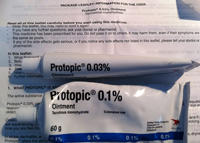
My dermatologist finally prescribed me Protopic, which I had been trying to get hold of for YEARS.? I had seen how much it helped my sister who had similar skin and eczema just like me. She now only uses it occasionally as a maintenance dose and has beautiful clear skin. Nothing, no medicine or steroid cream or treatment has ever had such a dramatic and life changing effect on my life. Eczema is a cruel condition and facial eczema as a woman is particularly hard to deal with. You can?t hide it. It?s right there. In your face! All day, every day. I will never forget those dark days but I will always be grateful for the chance to use this amazing immune suppressant. I would urge anyone with persistent facial eczema and red, sore flare-ups to speak to their doctor and ask for Protopic. It ?also works on other parts of the body affected by persistent eczema.? Don?t take no for an answer. Demand a referral to a specialist dermatologist. Get the treatment you deserve because no one should have to live with sore, painful, red eczema on their face, or anywhere. What many underestimate is the effect long-term eczema has on quality of life. Everything is easier to cope with now I don?t have to worry about how I look. There might be a few red thread veins and the odd wrinkle but I?m getting to know my skin now and I quite like it. Comment from Cathy: I enjoy reading your magazine with so much information. I was reading this eczema diary as I have various clients who come to see me as they suffer from this condition. I see that Protopic is a non steroid cream which is a plus, but, still it has a number of possible side effects. The usual question is why is the immune system over expressed, with right help (kinesiology, homoxicology, environmental medicine) the person suffering of eczema can find out what is bringing on the response then they can re-balance with a non invasive cream (Protopic) the symptoms and hopefully bring the immune system back to balance. In my experience these creams lead to long term side effects that often don't seem connected. If you suppress a symptom which is a gift that your body is giving you to help the organs of detoxification manage their job, the issue will pop up elsewhere. That is my experience.
6th June 2015 BBQ booby trap!  Summer is finally here and the weather is hotting up; households all over Britain will be dusting off their BBQs and getting the burgers on. There are lots of ways of making a BBQ safe for those with allergies but beware! Things can go horribly wrong! We'd got it all under control The sun was out and we were at a tennis party. Great fun with alcohol consumed between each game, you get the picture. Thank goodness I was driving or the outcome could have been worse.
What could possibly go wrong?
The lesson I'm taking away from this, apart from the fact that I'm still a stupid fool who doesn't take enough care, is that BBQs are not safe. EVER. I knew this really. I took the picnic sarnies and I should have assessed the situation and gone with this safe and available option. You have been warned! Safe barbequing, please people, and enjoy this summer while it lasts.
A harsh lesson for allergics - the world does not revolve around you! Some of you are not going to like this and I don't wish to offend anyone but we all need to learn how to accept our diagnosis and move on. There are people far worse off with life limiting disabilities so really, allergies aren't that bad are they?  Ruth and the 'A' Word – a picture she took for Allergy UK's Allergy Week theme - Living with allergies and anaphylaxis – Living in Fear I've been reading a lot lately on the net about what people want. You know, that ideal world where all production lines go nut free, where all cafes offer a wide range of products freefrom all the major allergens. The problem is guys, we are a long way off ever achieving that. It's just simple economics; it costs too much to serve what is really a fairly small percentage of the population so it's just never going to happen. Yes that sucks but we all need to get real. The world, most definitely does not revolve around you, me, and the allergic community. To comment on Ruth's diary piece please click here.
Salt baths, oils and bathing less for eczema skin  If you have eczema or dry, sensitive skin you'll know only too well, that tightening feeling when you get out of the bath or shower. Skin can very quickly feel taut and if you're not careful you will end up scratching. It's crucial to moisturise quickly but this can then make you feel dirty and slimy if you need to use greasy emollients. Trying to shower and bathe less frequently can make a huge difference. If you haven't been doing much, especially in the winter don't have a shower or bath every day, instead bathe every other day. Of course wash your face and other bits you feel need a little more attention but you don't need to wash so frequently, especially if you have dry skin. Soaps and shower gels strip your skin of what natural oils it may have managed to replenish and the cycle begins again. I am trying rhassoul clay to wash my hair and my skin at the moment and also experimenting with natural sponges which are such a treat for sensitive skin. I also have some hemp soap which is natural and kind to skin. Lock that salty goodness inI find the very best thing for my eczema skin is a regular salt bath. There are loads of salt products out there so make sure you get a pure mineral epsom salt product and not something with fragrance or perfume in it. Any good health food shop should stock this. Don't be tempted to use table salt as this could make you skin worse, it must be natural mineral salt especially for bathing. Why is so good for eczema skin? Well it is supposed to help relax you and remove toxins from your skin. It is also a natural anti-inflammatory and will give your body a dose of magnesium - studies have proved that a regular epsom salt bath helps raise magnesium levels. When is the best time to bathe? I find it helps most if you have your bath immediately before you go to bed. Sleeping with eczema can be very difficult, it's the most itchy time for many, but a salt bath seems to calm me and my skin so that I always have a great night's sleep. Simply run a warm bath (I actually find a really hot bath helps my skin but this can be detrimental to some people with eczema so experiment), throw in a few cup fulls of the salt and mix well. If you find it helps, exfoliate with a loofah as this will also help clear skin and smooth off dry patches. Be very careful this doesn't turn into a chance to have a good scratch as this defeats the whole object. Bath and essential oils can also help if a salt bath on its own doesn't appeal. I recommend Organic Babies and Pure Potions bath oils but remember, natural doesn't necessarily mean it won't irritate your skin so it's always best to test first. I always add a few drops of tea tree oil to aid healing. I have found that having a face cloth in a bowl of cold water by the side of the bath means I can cool down my face and also avoid getting the oils on my face as it can be very sensitive. Always have a window open too to help with ventilation. Overheating can make eczema skin itchy. Stay in the bath for 15-20 minutes maximum. If you have time you can apply suitable oil to your skin while it's still wet to lock in moisture. If you can, try to let your skin dry naturally but always pat dry with a towel and try to avoid rubbing as this can aggravate the skin and make it itchy. If you shower, keep the water warm, not too hot and keep the shower time to a minimum. I know a long hot shower can feel bliss but for eczema skin the timer is ticking until suddenly it's too late and you're so itchy you have to tear at your skin. Make sure you get out well before your skin reaches this point and your eczema will thank you for it. And always, always apply lots of moisturiser immediately after your bath. I find Epaderm works great when my skin is very bad as I need so much of it to keep my skin under control. You could try pure coconut butter or shea butter if you want something a bit purer but always test - some people can react to these oils on their skin.
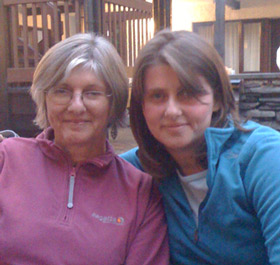 'I always wondered if it was my fault....' says Ruth's mum. Last month we heard what it was like being married to someone with multiple allergies, but what was it like for a mother with an allergic child in the 70's? It was a bit weird interviewing my Mum, not least because it was a long time ago and she couldn't really remember much. It wasn't a big thing then, When she was about two or three, before going to school Ruth started to get eczema. Before that she was just a beautiful normal baby. Her skin was really bad and she used to scratch and scratch and wake us up at night crying. It all started when I began weaning. We did see dermatology specialists at Amersham Hospital who were helpful but the only thing then was the treat the eczema with ointments, steroids and oil baths etc. These did seem to help but the eczema never really went away. We were told, "your child just has eczema and she will probably grow out of it..." which to some extent she did, but it all came back in her 20's. The nut allergy wasn't apparent until Ruth was much older, at school and I think about nine or ten years old. I never gave her any nuts when she was small because that was the advice at the time mainly due to the chance of choking. She would get strange random sickness bugs and vomiting but children can be like that so I didn't put two and two together for some time. These things usually happened on birthdays, special occasions or at Christmas when nuts and chocolates were around. She never liked nuts and never wantrd to eat them. She refused nuts when I gave her some and since she was not a fussy child I just didn't give her them again. But the reactions, I worked out, were from accidentally eating nuts. I found a huge nut in a bar of plain chocolate she was eating one day which made her very ill. She also had another incident after eating some crisps from a bowl I had just refilled... the penny started to drop when I remembered afterwards that maybe there had been nuts in that bowl beforehand... I think I knew it wasn't just the usual childhood sickness because she did used to go very peculiar but she always recovered fairly quickly and was back on her feet the next day. I realised something was very wrong when she accidentally took her brother's peanut butter sandwiches to school; she ate some and was very ill and was sent home. I used to put stickers on, Blue for David, Yellow for Catherine and Red for Ruth and I had got the stickers the wrong ways round. I then remembered an incident at her first school when she was forced to eat peanuts in a school dinner and that made her very sick. It sounds like we should have worked it out sooner but no one, least of all our doctor, had heard of peanut allergy. Eventually she did get the peanut allergy diagnosed and was advised to avoid all nuts. Great advice, but this was in her early teens, when she was just starting to venture out on her own so I was glad she was a very sensible girl. I was confident she understood, and hated being ill so she would be fine, just avoiding nuts. There was no such thing as an EpiPen then. When Ruth was about 18 she went out for a curry with friends. She checked with the staff and ordered a nut free meal but they had just picked the nuts off. She was really very ill and it was clear that this reaction to nuts was getting worse. She had her first real anaphylactic attack, whilst out with friends knowing nothing about what was happening. They took her to her boyfriend's flat where she passed out, but, thank goodness, she recovered. But it was a lesson on not taking any more risks and we went back to see the doctor. It was around this time that we read the tragic story of David Reading's daughter who sadly passed away after eating nuts. This really shocked us both so she joined the Anaphylaxis Campaign and finally began to get some real advice about what her allergy was, why it happened and what she needed to do to stay safe. As anaphylaxis became more widely understood, I wondered whether my cravings to peanuts when I was pregnant with Ruth could have caused her nut allergy. We also discovered that one of the bath oils she was prescribed, which irritated her skin immensely contained peanut oil! I still worry a little, especially now she is jetting off on her own to conferences but I know that, with her blog and her years of experience, she knows what to do if a mistake does happen. In some ways I'm quite glad we went through her childhood in blissful ignorance but, had I known, maybe I could have done something more to cut out the dairy and so help her eczema or be more careful about nuts in the house. The thought that I could have prevented some of her suffering does make me feel a little guilty but we just didn't know what doctors know now. I am immensely proud of Ruth and what she's achieved. My daughter is a top blogger and I didn't even really know what a blogger was when she started it. I tell everyone I meet, in supermarkets and cafes about whatallergy.com, it's amazing how many people you get chatting to who have a nut or wheat or dairy allergy. It does seem to be so much more common now and even some of my friends my age are suddenly developing problems with wheat and gluten.
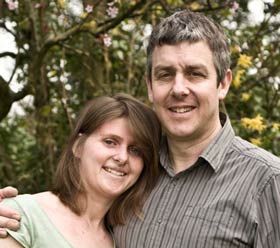
Marrying the allergic girl So far this allergy diary has been all about me and what I think, so I thought this week I'd find out what Mr What Allergy? - AKA my husband! - felt about being married to 'the allergic girl'. And not just any old allergic girl, but a girl who is allergic to most of his favourite things. This is what he said... Q1) When you met, did Ruth have allergies? Q2) What annoys you most? I miss peanuts - I also LOVE peanuts, I crave them, but they're banned from the house because Ruth is so allergic to them. I also never eat them when I'm out because her lips have swollen up once after I kissed her hours after eating peanuts. Meal times - Meal times can be complicated. I sometimes have the same as Ruth but because she avoids so many foods we often end up cooking two meals. I would never have the patience to do this but she does it so that I can still have tomatoes in my chilli or a cheese sauce etc. It's easy for me to grab a ready meal from the freezer; Ruth does this too but only from her pre-cooked and labelled tubs she cooks in batches. Washing up - Because she prepares breakfast, lunch and evening meals, often the kitchen looks like a bomb site every day. We do have a dishwasher and Ruth does a lot of the washing up but it drives me mad. There are always pans and plates from some freefrom creation on the side. Making mistakes - I make mistakes and I know she does sometimes too but if I try tobuy some biscuit or treat from the shops I often get the wrong thing so am inclined not to bother, which I know is not the right attitude. Eating out - Eating out with friends and family can also be frustrating. The conversation ALWAYS gets on to Ruth's allergies, how awful it must be, and how does she copes. There is so much more to Ruth than her allergies. Holidays - We would both also love to visit the sub continent but it's just too hard with Ruth's allergies. Our honeymoon in Sri Lanka was fraught with problems since they didn't understand. Most of the dishes were curry based and many had peanuts so she was too scared to try anything. We usually go camping or self catering still involves cooking or militarily planned meals out. Ravenstone Manor for the FreeFrom Eating out Awards was a high point - she could eat most things on the menu and I have never seen and spoken to a chef that I have trusted more than that guy. Taking risks - She does take risks and doesn't always listen to me when I say not to try something e.g. salami that contained dairy. I also worry when she goes out without me - what if something goes wrong and she gets carted off to A&E with anaphylaxis. Getting that call to get to the hospital is awful. Q3) What are the good things about marrying the allergic girl? Ruth is also incredibly easy going and when I look at the aggro some of my mates get from their wives I know I chose a good one. Despite all her allergies she is happy (most of the time) and fun to be with and she never lets it rule our lives. She doesn't let her allergies stop her doing anything - apart from eating at Indian restaurants and travelling to the Far East but you can't have everything. Q4) What advice would you give to someone who is thinking of dating someone with multiple allergies? Going on a freefrom cookery course or getting a good allergy cook book and learning how to prepare some basic dishes without the allergens would really help. Maybe I need to look into that... To comment on the issues raised in Marrying the Allergic Girl, please click through to our Facebook page here.

Just two of many similar comments on the BBC Facebook page after the a short report on the new labelling law aired last Monday on BBC Breakfast in which I featured: Would these people suggest all wheelchair users stay home because it's too difficult to provide easy access to restaurants? If not, why is it alright to suggest that allergy sufferers should just stay at home, because it is too difficult to ensure that they can eat safely? And why is it funny to call us the 'allergy woman' or the 'awkward one' or, adding insult to injury, to question whether we do really have an allergy at all? This is not a lifestyle choice. We did not choose to be like this. We did nothing wrong and in fact, even doctors don't really know why this is happening to us. Allergies are serious business and need constant vigilance but they shouldn't mean we are treated like second class citizens. I have had so many anaphylactic reactions to meals when I have attempted to eat out over the years that now I rarely even try. But why should I be cooped up in my house and never able to eat out with friends or family? I am fed up with staying at home so that as few people as possible have to be affected by my allergies. I am standing up for my rights to join in society, to eat out, to enjoy a meal cooked by someone other than myself. I want to try new foods and I want to be treated with respect. So get over your prejudice, Breakfast viewers – and be grateful you don't have allergies too. These new allergen laws will make eating out much safer for those with allergies – but only if people embrace them and understand what they mean. And what do they mean? “This law will mean pubs and restaurants close because they can't afford to comply. It will crush every chef's creative flair. " Will it? What rubbish! The law does not say that every restaurant must rid their kitchen of all 14 allergens. It says that they must know which allergens are either present or at risk of cross contamination in their food and be able to communicate this verbally. There is no obligation on them to provide allergen free food. So restaurants could just tell everyone with allergies that they are not safe to eat there. That could well be the way many establishments go and I completely respect that. I would far rather be advised that eating somewhere is not safe than be given false assurances and become ill. Not every kitchen will be able to cater for those with allergies, but they DO absolutely need to understand their menu and dishes so that they can warn allergic diners. Here's an analogy for you. If you were driving along and a child ran out in front of you, even if you were not speeding and hadn't been drinking, you would never get over an accident like that, especially if the child was seriously injured or killed. Nobody would laugh about such an incident, blame the child, or say either party should have just stayed at home. Should all children stay inside and never go out for fear they may get run over? No, of course not. Instead we bring in safety laws, improve car performance, visibility, road lighting and markings. We educate our children about staying safe on the roads. We do everything we can to prevent accidents and we drive as safely as possible. So, imagine you cooked a meal which accidentally contained a trace of an allergen and someone with an allergy was rushed to A&E with anaphylaxis. Imagine if that person died? I don't think anyone wants that, least of all a chef, who just wants all guests to enjoy their food. Nobody would intentionally put another at risk. What these new regulations are doing is to attempt to insure that nobody does. If you want to see the BBC Breakfast piece click here. Here to see some of the comments see the Facebook book page – but you will need to spool down to the 8th December. You will, incidentally, see many, many balanced and sympathetic posts there as well. For the story behind the filming, see my blog here.
Breaking out.... This year really has seen me leaping out of my comfort zone and bursting that little bubble of security. Fed up with cooking every meal at home I have been eating out all over the place, in Copenhagen, Birmingham, London, Hemel Hempstead and even up North! 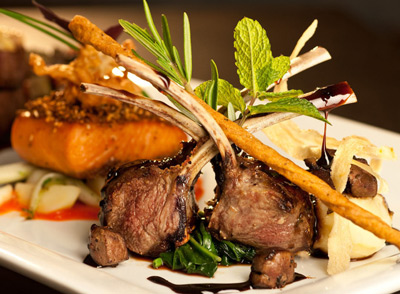
I know it's not easy. I'm allergic to nuts, wheat, dairy and soya and also cannot eat tomato or celery. Not the best combination. I have been described as 'every chef's worst nightmare!'
This all sounds like obvious stuff, but it's very easy to make mistakes. I know, I've made them all, but please try it. Be brave and demand better because YOU deserve it!
How Protopic changed my life 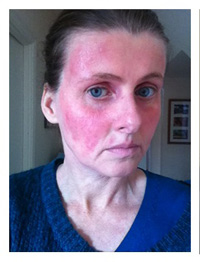 “Sorry were you talking to me?” This is how I have felt over the last few months. Something really weird has happened and I wasn’t prepared for it at all. I am still completely at sea as to how to react. Unexpectedly and in my early 40’s I have miraculously discovered that I actually have great skin and an amazing complexion. Who’d have thought it? Those of you who know me will understand how long I’ve struggled with facial eczema. Sometimes it was just dreadful, sometimes it wasn’t too bad and sometimes I even felt like it was looking OK. Often on those occasions when I was feeling good about my skin someone would say, 'Oh you do struggle with your eczema, it looks really sore.' Or 'Your skin looks a bit dry, you should moisturise it.' WHAT? I had thought I looked half way normal! That put me in my place. So to have people gazing at me open mouthed. To see their faces as they do a double-take and recognise me and say, 'WOW, Ruth you look great'.It’s weird. EVERYONE is showering me with compliments and telling me how incredible my skin looks. Even strangers... no really. What’s going on? I am really not used to compliments and completely ill equipped at dealing with them. This has honestly NEVER happened to me before. My husband now cuddles me and strokes my skin. This has also never happened, partly because it used to hurt me or tickle and make me itch. Another plus to Protopic!  My doctor, and I love him for this, prescribed me Protopic, which I had been trying to get hold of for YEARS. I had seen how much it helped my sister who had similar rubbish skin and eczema just like me; Protopic worked so well for her; she now only uses it a few times a month as a maintenance dose and has beautiful clear skin. Nothing, no medicine or steroid cream or treatment has ever had such a dramatic and life changing effect on my life. It really is a miracle. I can’t quite believe that this is my skin. Someone is going to knock on the door any minute now, walk in and say, ‘Hang on a minute, times up. Give back the nice skin. You can have your horrible dry, red itchy eczema face, that one isn’t yours’. Eczema is a cruel condition and facial eczema as a woman is particularly hard to deal with. You can’t hide it. It’s right there. In your face! Consequently there are not many mirrors in our house because I have grown to loathe them.  So I would urge anyone with persistent facial eczema and red, sore flare-ups to speak to their doctor and ask for Protopic. I think it works on other parts of the body affected by persistent eczema as well. It’s an expensive treatment which is why begging is necessary but it really does work. Ed:
 Is there an eczema solution? Anyone with eczema has probably spent most of their life searching for it; that elusive solution to all your itching woes. I’m afraid I don’t have amazing news: there really is no eczema cure, but there are lots of tiny changes you can make to your life that will make a big impact on how you manage your eczema. My eczema has been pretty bad lately and sometimes it’s useful to go back to basics and see what things you’ve stopped doing, what lessons you’ve forgotten, but our bodies are such complex machines that it’s not always that easy. Things change too. Cycles repeat, maybe after years of good skin things can flare-up for no good reason. Suddenly you may begin to react to certain skincare products or foods.  The book explores firstly your habits. When do you scratch most? Are you more itchy at certain times of day? Do particular activities trigger itching and does it affect only certain parts of your body? Most importantly, how often do you scratch? Then you count, actually count every scratch which is depressing as the numbers sky rocket. Then you get to the good bit, how to reverse the habit of a lifetime. One technique did stand out which does help me. I press a finger nail on the itch and hold still for 30 seconds. Dangerous, as one slip could go from safety to gouging and digging at the itch. Distraction techniques can also work well – can someone sit on my hands, please? But no amount of habit reversal or understanding is any use if something unknown is causing your eczema and there can be a myriad of different things for each person. e.g. is your skin too dry, are you hot, stressed, is your clothing itching, are you allergic to dust, airborne allergens, food allergens? I could go on and on. The importance of regular exercise, eating a balanced healthy diet, using emollients effectively, keeping hydrated, getting the right nutrients and minerals, avoiding stress and triggers etc. are all vital in managing eczema. Basically you have to be perfect, never eat anything bad, not drink alcohol or coffee, go to bed early, and be a saint forever. It’s almost impossible to maintain so we slip back into stress, itching, scratching, using steroids and lack of sleep.Until you’ve had eczema you will never understand the deep, urgent, painful, distracting and completely disruptive urge to scratch. The one thing the book doesn’t address is the affect food can have on eczema. It is well documented that there is a direct link with dairy and delayed eczema reactions. I know this is one of my triggers. So no amount of habit reversal and saintly behaviour is ever going to help if you’re still eating that cheese you love so much. The important thing is to learn how to stay in control or yours. What triggers your flare-ups? Don’t feel bad if you give in to that incredible urge to scratch. It’s OK to scratch, don’t beat yourself up. Instead learn from scratching episodes, think about why it happened and what you might do differently next time. Yours, still searching for my eczema solution ... ‘The Eczema Solution’ by Sue Armstrong-Brown, 2002 N.B. John Scott penned a lengthy response to Ruth's diary entry suggesting that the answer to her problems might like with helminthic therapy. You can read it here on out Skinsmatter site.
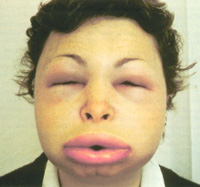
The state of the nation’s understanding of Anaphylaxis My allergy diary has taken me across Europe this year to the European Academy of Allergy and Clinical Immunology (EAACI) where I attended an The EAACI anaphylaxis programme, sponsored by Meda, who supply the EpiPen adrenaline auto injector (AAI). We know it’s an uphill battle educating friends, family, colleagues and the general public; awareness is growing but you would expect a fairly good understanding amongst doctors, paramedics, chemists and pharmacists and even teachers, wouldn’t you? At least better than the rest of the community. Well think again. The level of understanding of anaphylaxis across Europe is very poor. Nikos Papadopoulos, President of EAACI sees his role as continually lobbying the European Parliament for tougher guidelines and better awareness. EAACI ran a campaign this year focused on how 150 million people with allergies feel trapped by their condition. Their video is a good start but could have gone so much further. There is still a very long way to go. We cannot escape the fact that the number of people with allergies is on the rise but we should all take some comfort and hope in the huge efforts being taken by all the members of EAACI who understand the problems and are exploring ways to improve understanding in the future. Together, we CAN all make a difference.
What is the future for people with allergies?
Seeing everyone working towards the same goal of making life for those with allergies easier was very encouraging. The theme of the event, being ‘trapped’ by allergies, exposed the huge gap between specialist advice/diagnosis and what life is actually like living with allergies. Very few specialists understand what it is really like to live with allergies day-to-day and they all admit there is a huge disconnect. So what does the future hold for those living with allergies? Here are few insights from EAACI:
Right across Europe the same issues are being seen and the same mistakes being made. We still have a very long way to go but what I would like you all to know is that you are not alone. There are thousands of specialists right across Europe all trying to discover ways of working together, sharing learnings and making life with allergies easier. Wouldn’t we all like to feel a little less ‘trapped’ by our allergies?

Tales from the front line – eating out in a foreign country (Image – Ruth's DELICIOUS steak...) I have just survived four days and three nights in Copenhagen, Denmark and strayed so far out of my comfort zone I almost ran screaming from the restaurant at one point. I had also prepared my usual A4 sheet with a list of foods I cannot eat with their Danish translation, just in case! I always take a copy for each day of the stay and a few spares because you invariably don’t get them back. Often they want to keep them and make notes of what they served you should there be any problems after you leave. This proved very useful and they particularly liked my translated ‘thank you’ at the end. Tak!
The psychological effects of living with facial eczema and allergies 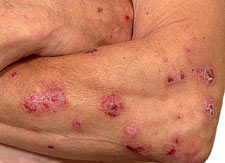 Some days my skin hurts so bad and itches ALL the time and I just want to curl up and go to sleep and not have to go on like this. Some days my hands and fingers ache from scratching so hard. My body is bruised from scratching with no finger nails, cut short to limit damage. (The image here is of Nodular Prurigo, a form of eczema from which I am currently suffering – although I hasten to add that these hairy arms are not mine!) It is deeply depressing, exhausting and overwhelming trying to work, live, smile, go out, socialise or achieve anything when you’re hurting all over. You feel lost. No one knows why this is happening to you or what you should do to stop it, except avoid more and more foods.
It’s no wonder that people with allergies and eczema are prone to depression. When does it end? What will become of this allergic girl, on an allergic march she never really wanted to join?
How important is the ‘allergic load’ and how do you stop the allergic march? In the last few years I seem to have been acquiring new allergies. Last year it was soya, kidney beans and broad beans (all legumes), foods which appeared to be safe and which were eaten quite happily with no side effects suddenly causing full on allergy reactions and asthma.
Why do some of us become more sensitive? Why do the things we react to sometimes change? It seems no one really knows the answer. Being 'on the allergic march' is just one long learning curve and a complicated journey too! I would quite like to get off the allergy train now but it seems I missed my stop!
Getting an allergy diagnosis – know your body
Do you know what foods cause your reactions? Once you know your body you will be better equipped to achieve the best outcome. Visit your doctor with this kind of information and you should be able to get that referral.
Allergy services - Getting the support you need You might assume that with the growing numbers of children and adults with allergies in the UK it would be easy to get the help and support you need. With only five specialist allergy centres in the UK and just 30 specialist allergy doctors it can be a challenge. Excellent support is also provided by nurses, dieticians and doctors who have made extra effort to research the subject but it is very much a postcode lottery.

Cheese! Dear dairy... Recently I had to watch my husband grate Cheddar cheese over his chilli and witness the melting loveliness before my very eyes. I pretend it’s OK, really - that I don’t mind. But I DO mind. I mind a lot. I miss you so very much. What did I ever do to you dairy? Why do you hate me now? I tell myself that I am coping perfectly well without you but who am I kidding? Milk can go and curdle; I hated milk from the very first taste, it always made me feel sick. But cheese and butter... I loved. I could tolerate butter, natural yogurt and hard cheese until my early twenties when my eczema just became so out of control that I had to explore drastic measures to help it heal. To cut a long story short, I took a Chinese herbal remedy to cleanse my body and also cut out dairy, wheat, soya, sugar and eggs for a few months. My skin got far worse before any signs of improvement but eventually it was completely clear again. No more early soaks in an oil bath and layers of emollient just to allow me to move my limbs without splitting the skin.
Learn to turn the other cheek when your old love flaunts it in front of you with your husband, family and friends. He’s just not worth it (in my world dairy is a man!). I’m so over you dairy (NOT!). (Image: a deilcious traditional Quickes truckle cheddar...)
More thoughts on auto-injectors.... Just do it! Don’t panic. Use your auto-injector and phone 999... Since comparing Emerade, Epipen and Jext in the last newsletter I wondered how you all felt about yours. Do you feel comfortable using it? Are you scared of using it?
My throat and tongue swell up so badly when I have anaphylaxis and the asthma makes it almost impossible to speak. At what point during these extreme allergic reactions did my brain compute that it was best not use my injector and get help? For more details on surviving and attack an d on how to write an Action Plan see Ruth's article here.
Adrenaline Auto-injectors explained - Which one do you use? EpiPen is distributed by Meda Pharmaceuticals, Jext is produced by Alk Abello and Emerade is distributed by iMed Systems Ltd and will be available on prescription from February 2014. AnaPen used to be prescribed but hasn’t been available in the UK since February 2012 and they have no plans to supply the UK at this point. |
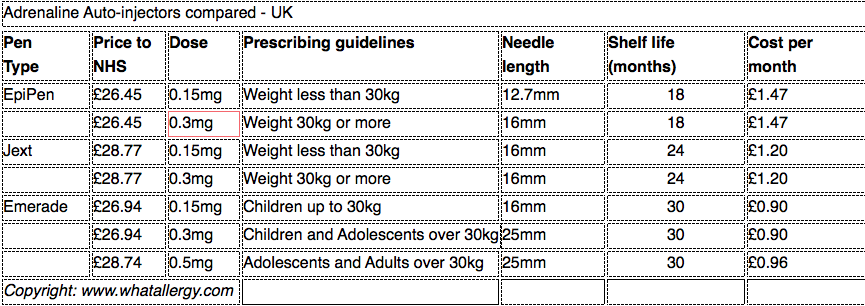
 All three injectors now have a needle shield which protects your fingers after use. This is now required following quite a few needle injuries reported by users There have been some concerns about the requirement for a needle which will penetrate the thigh sufficiently to reach the muscle. Some doctors think that this is necessary for the adrenaline to work effectively. Whilst the JEXT and the EpiPen have 16mm needles, the Emerade devices for older children and adults have 25mm needles. The Emerade also offers a full 0.5mg dose for adolescents and adults over 30kg. How easy are they to use?All three injectors are quick and simple to use with a few slight differences in how they work. You can find detailed instructions and videos showing you exactly how to administer each injector on the manufacturers' websites (links below). The JEXT and EpiPen devices have safety caps at the top of the device, whilst the Emerade safety cap is actually over the needle – rather more like a lid which needs to be removed before use. Having now tried out all the device trainers, this key difference intuitively seems to make a lot of sense. I would urge you all to make sure that you, your friends and your family know how to use your adrenaline injector. Request a free training device and then practise, practise, practise! Make your friends and family practise on you too. I am proof that in a stressful situation, when you are having a reaction, you don’t always do the right things in the right order. (See my near fatal experience here.) Remember that all these devices are for emergency first aid only. If you need to use one, you must also get emergency medical care. Dial 999, ask for ‘ambulance’ and say ‘anaphylaxis’. So… go to the websites below and see what you think. You may not get much choice which pen you’re prescribed. The decision may be made by your local NHS Health Partnership, probably based on cost and shelf life, but what if we could have a choice?
Which one would you prefer? And let’s hope you never have to use it!
Be thankful in 2014 – having allergies can be a gift 3. Go processed food free for a week – Every year the array of freefrom foods in supermarkets and health food stores is growing. Many of these are healthy and natural but some contain lists of ingredients you might not be able to identify. Freefrom is not always healthier – read labels, understand exactly what you’re eating and analyse the salt, fat and calorie content. Why not try eating only natural, fresh food for a whole week and see how you feel?
NB Information on this site is not a substitute for medical advice and no liability can be assumed for its use. |

 Because if I met someone who had eaten peanuts in the last few hours it could give me an allergic reaction. It’s happened to me in the past, a kiss that gives you far more than you bargained for! Lips that would make any model jealous of your fish-pout.
Because if I met someone who had eaten peanuts in the last few hours it could give me an allergic reaction. It’s happened to me in the past, a kiss that gives you far more than you bargained for! Lips that would make any model jealous of your fish-pout.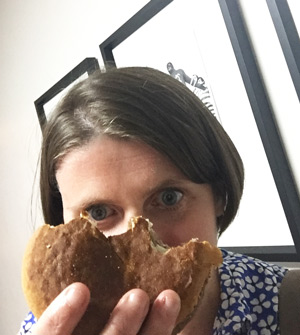

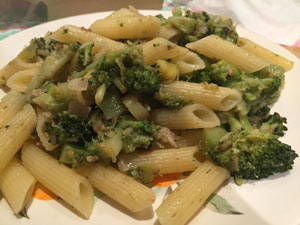 We had ours with salmon but it would go equally well with some chicken. This recipe would make the perfect starter or a light lunch. It would also look amazing with different coloured broccoli.
We had ours with salmon but it would go equally well with some chicken. This recipe would make the perfect starter or a light lunch. It would also look amazing with different coloured broccoli.  I’m just back from an idyllic week’s holiday in Sicily, a very brave move for me as those who know me will appreciate. Being allergic to nuts, dairy, wheat and soya has always made me very wary of visiting Italy, a country where pastas comes with every meal. I also can’t eat tomato which really does rather limit what you can eat.
I’m just back from an idyllic week’s holiday in Sicily, a very brave move for me as those who know me will appreciate. Being allergic to nuts, dairy, wheat and soya has always made me very wary of visiting Italy, a country where pastas comes with every meal. I also can’t eat tomato which really does rather limit what you can eat.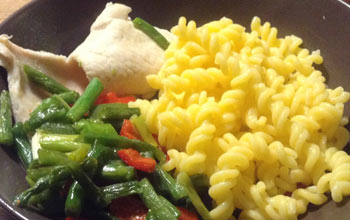 We bought fresh produce; lots of olives, fruit, eggs, cooked meats, and fresh meat and vegetables to cook at the villa and ate really simple meals. I took quite a lot of food with me as usual and we ate really healthily and just enjoyed the rest and relaxation.
We bought fresh produce; lots of olives, fruit, eggs, cooked meats, and fresh meat and vegetables to cook at the villa and ate really simple meals. I took quite a lot of food with me as usual and we ate really healthily and just enjoyed the rest and relaxation.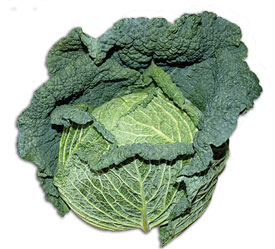 I've done the 'Go Processed food free challenge' so many times before but I don't keep it up. I slip into the easy ways and start using processed #freefrom foods again and my health starts to suffer.
I've done the 'Go Processed food free challenge' so many times before but I don't keep it up. I slip into the easy ways and start using processed #freefrom foods again and my health starts to suffer. I need my own dedicated waiter or allergy advocate
I need my own dedicated waiter or allergy advocate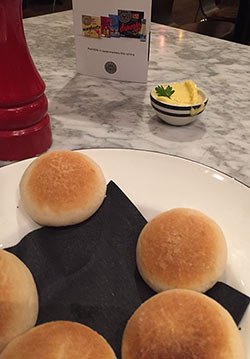 Pizza Express are a consistently reliable option for me because I know I can get a safe meal there, even if it is 'just a salad'.
Pizza Express are a consistently reliable option for me because I know I can get a safe meal there, even if it is 'just a salad'.  What I do is immediately filter out most of the menu and hone in on one or two very safe options. It means I eat a lot of steak or plain meat with no sauce but it does limit the amount of questioning required. I gauge the situation and I never eat anything unless I know exactly what's in it.
What I do is immediately filter out most of the menu and hone in on one or two very safe options. It means I eat a lot of steak or plain meat with no sauce but it does limit the amount of questioning required. I gauge the situation and I never eat anything unless I know exactly what's in it. No more ready meals, pot noodles and TV dinners for me. I had to learn how to cook, shop and see food in a totally different way. It was NOT easy. I was a girl who loved school dinners and airline meals. No accounting for taste!
No more ready meals, pot noodles and TV dinners for me. I had to learn how to cook, shop and see food in a totally different way. It was NOT easy. I was a girl who loved school dinners and airline meals. No accounting for taste! However last month I attended The annual meeting of the
However last month I attended The annual meeting of the 










